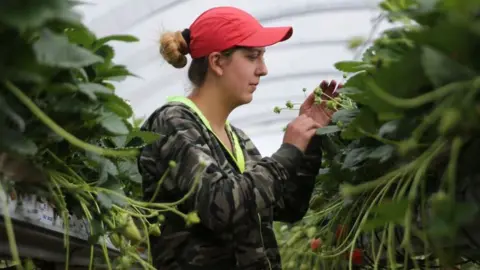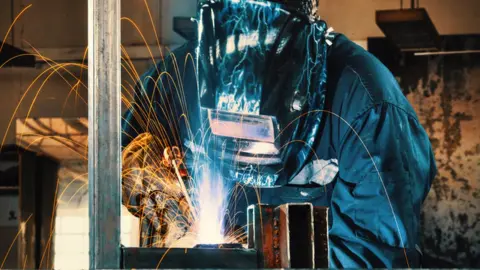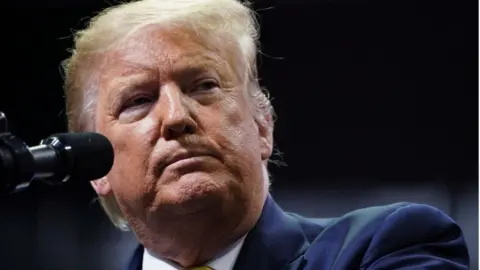The Brexit trade-off with the economy is under way

 Getty Images
Getty Images- The British economy has embarked on a historic change, involving at least some pain, some opportunities and an uncertain destination.
- The immigration policy changes will have far reaching consequences.
- Business has been served notice that the economy will take a lower priority than 'getting Brexit done'.
- The rupture with Europe is supposed to be followed with a cosier US relationship, but the hotline to the Oval Office has turned frosty.
The history books will record 31 January as the day Britain exited the European Union.
But historians should give at least as much status to 19 February - the day the Brexit rubber hit the road.
It's been a long time coming and businesses can't say they weren't warned.
Perhaps they thought, until December's election, that Brexit wouldn't happen, or that the interests of the economy would prevail in the end.
But the new plans for a points-based immigration system confirmed their fears - that in the trade-off between 'getting Brexit done' and economic performance, the latter will be the loser.
In charge of this policy, Priti Patel continues the approach taken by Theresa May when she was home secretary - setting out policy in bold, stark, uncompromising terms, presumably because that's what Leave voters expect and understand.
It may yet be that the policy is softened at the margins, as exceptions are made for the care sector, and perhaps a bit more for farming.
But for now, this is immigration policy in high-contrast monochrome.
The war zone
Some form of exception may also have to be found to save Scottish Tory faces. Jackson Carlaw's party made an election commitment in December to have an immigration policy that works for Scotland's demographics and economy, and it's not clear that message has yet reached the Home Office.
Going out to explain the policy and how it will work for Scottish employers seemed to be beyond every rank of Tory contacted by BBC colleagues. It seems they were all too busy on Wednesday.
Forced to comment by Holyrood journalists on Thursday, the Scottish Tory leader fell some way short of enthusiastic support for Ms Patel's plans, instead suggesting that elements of the SNP government's approach are worthy of consideration.
Let's see how that plays when Mr Carlaw's memo is lobbed into the Whitehall war zone that is, we're told, Priti Patel's private office.
Points mean prizes
For Scottish business, there were elements of the Patel proposals to be welcomed, in that they were less bad than the previous draft.
There is a four-fold rise, to 10,000 across Britain, in the visas for farm workers. And the £30,000 threshold for getting a visa has been lowered, on the advice of the UK government's migration advisory committee.
No longer was there to be a cap on skilled workers coming into the UK. But that's where business's diplomatic welcome ended.
The vague talk of "an Australian-style points system" which featured in the election campaign, had meant next to nothing.
But it became less vague when points were set out for salary, job offer, qualifications, more for a doctorate, and more still for a science and technology PhD - "the best and the brightest". Throw in English language skills, and you might get the 70 points for entry into the UK jobs market.
 Getty Images
Getty ImagesEmployers already used to the visa regulations for non-EU migrants find it "notoriously complex and costly", according to the Federation of Small Businesses in Scotland.
So once applied to every foreigner, including the high proportion of small firms in Scotland that have got used to European recruitment, it's a daunting prospect.
Activating the 'inactive'
That's the way it's meant to be, argues Ms Patel. Firms are going to have to adapt, and train up British workers. But which British workers are these?
There's an exceptionally low level of unemployment across the UK these days - statistics which sit oddly with the lack of growth or confidence to be found in other data.
So the home secretary has pointed to the 20%-plus who are designated "economically inactive".
If anyone in her private office had explained to her that these people include those who stay at home to care for their children or for elderly parents (including, one imagines, quite a lot of bedrock Tory voters), plus those who are full-time students or suffering from long-term illness, then the briefing hadn't sunk in.
In other words, the economically inactive are not sitting idly at home, available to be sparked into activity as care home workers through the gently persuasive powers of a Home Office taser. Or even a rise in starting pay.
Call for flexibility
The CBI was more polite than most business groups, arguing that the choice should not be between training up British workers or recruiting from abroad. Instead, it requires a bit of both.
Scottish farmers' leader, talking to ITV Borders, sounded dismayed, and rebellious. He's thinking again about the potential for Scotland running its own migrant worker policy.
The CBI hasn't ruled that out either, if the UK system fails the flexibility test.
The construction industry pointed out that shutting off access to Europe's skilled workforce will mean higher pay.
That's a plus, for those who had to wait until this week to find their average pay had finally caught up with the spending power they had before the descent into banking crisis 12 years ago. (That's a factor that probably had a lot to do with the Leave vote in 2016.)
Trade unions don't like to look anti-foreigner, but they have seemed uncharacteristically quiet about this, public sector Unison being an exception. In the private sector, they won't be complaining if skill shortages give them pay bargaining leverage.
However, the construction industry's representative pointed to the further consequence of pay inflation - that government priorities of building more housing and tackling climate change will become more expensive. That goes for the household shopping basket too.
 Getty Images
Getty ImagesThe visa plans' airy dismissal of migrant workers with 'low skills' no longer being allowed in to Britain offered a strange sort of opportunity, at least for the care sector.
Donald Macaskill, who speaks and negotiates on behalf of Scotland's private care homes, offered up a blistering denunciation of those who think caring for those with dementia have 'low skills'.
He was visibly angered.
And this was a chance to point out that demographics and labour shortages require us to think very differently about the lower-paid care workers with superhuman levels of patience and devotion to the care of elderly people.
'A change is gonna come'
It would be hard to overstate the significance of the change that is now under way.
In the past forty-plus years, there have been waves of massive and sometimes painful change in the British economy, including the clear out of heavy industries and mining, and later of the electronics assembly of Silicon Glen.
With each wave of closures, there was a re-orientation of the economy, adjusting to the seamless supply chains and markets of the growing and integrating European market, and ever more dependent for labour on the skills and flexibility that the vast European labour pool offered.
With the labour market plans set out on 19 February 2020, all that is set to change.
The future economy may see British-born workers on higher pay, with more skills and at the cutting edge of automation, breaking free of petty regulations to occupy the sunny uplands of the 21st century global economy.
That's the theory, but it's far from guaranteed.
Meanwhile, the only certainty about the transition, wherever it takes us, is that it will take time and it will involve some painful dislocation.
Trump card
Around the plans to end 'low-skilled' migration have been the pre-talks positioning and posturing of UK and EU negotiators. These should together serve warning that links to those EU supply chains and European customers are going form seamless to sticky, and perhaps increasingly costly.
Brexiteers have told us to look beyond Europe, starting with the landmark trade deal to be struck with Donald Trump.
 Reuters
ReutersReports from Westminster suggest these Atlanticists are increasingly concerned that the personal chemistry between President and British Prime Minister has turned into a volatile compound when exposed to heat. A visit by Boris Johnson to Washington had to be postponed five days ago, rather than face a snub over the Huawei issue.
A terse, details-free 'read-out' from a phone call between Downing Street and Oval Office on Thursday evening did nothing to reassure.
Their previous call is said to have ended with President Trump abruptly and angrily hanging up on his British chum.
On Thursday, we're told the leaders signed off their call with reference to their next meeting, at the G7 summit, in June.
That's right - not until June. And this is now Britain's most important trading and diplomatic relationship.
